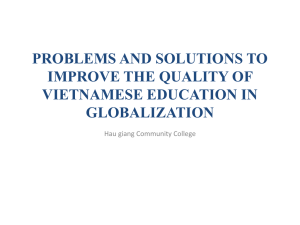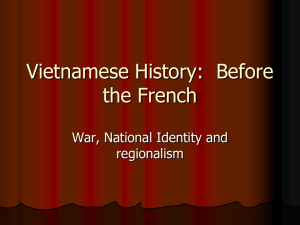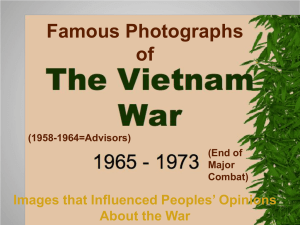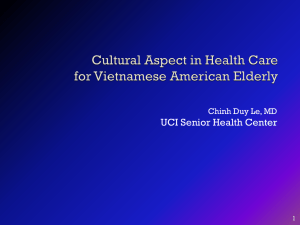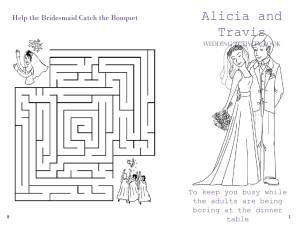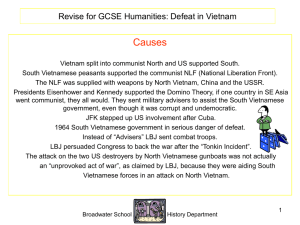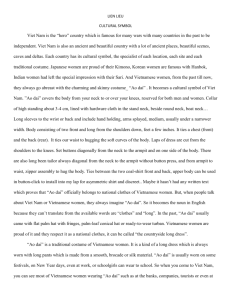File
advertisement
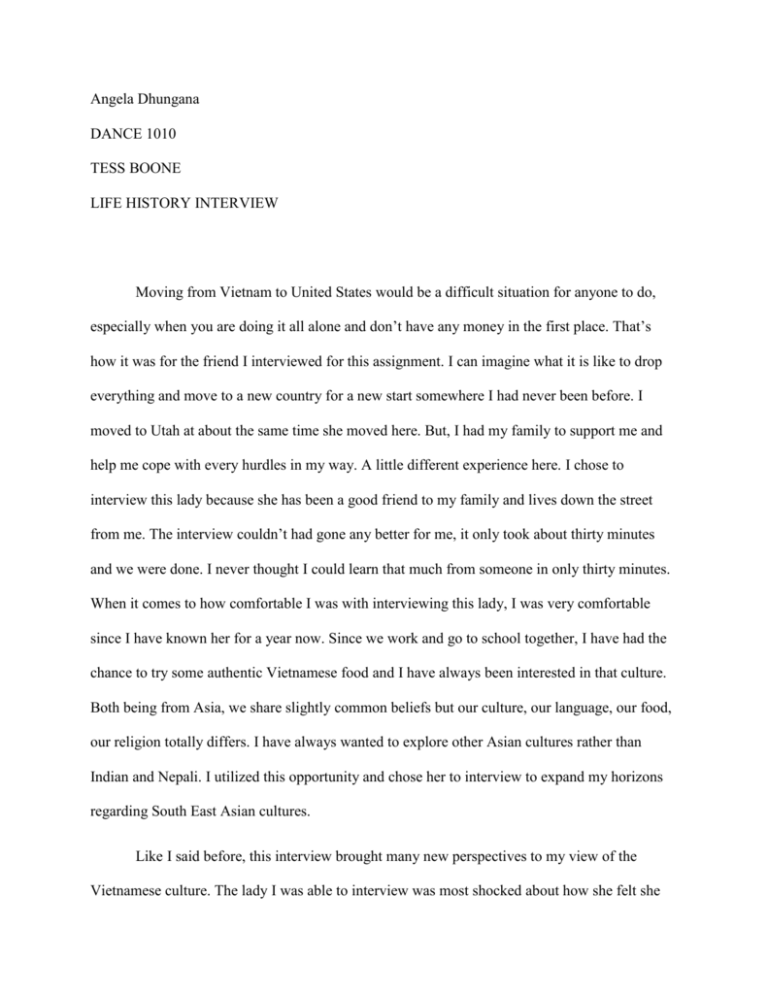
Angela Dhungana DANCE 1010 TESS BOONE LIFE HISTORY INTERVIEW Moving from Vietnam to United States would be a difficult situation for anyone to do, especially when you are doing it all alone and don’t have any money in the first place. That’s how it was for the friend I interviewed for this assignment. I can imagine what it is like to drop everything and move to a new country for a new start somewhere I had never been before. I moved to Utah at about the same time she moved here. But, I had my family to support me and help me cope with every hurdles in my way. A little different experience here. I chose to interview this lady because she has been a good friend to my family and lives down the street from me. The interview couldn’t had gone any better for me, it only took about thirty minutes and we were done. I never thought I could learn that much from someone in only thirty minutes. When it comes to how comfortable I was with interviewing this lady, I was very comfortable since I have known her for a year now. Since we work and go to school together, I have had the chance to try some authentic Vietnamese food and I have always been interested in that culture. Both being from Asia, we share slightly common beliefs but our culture, our language, our food, our religion totally differs. I have always wanted to explore other Asian cultures rather than Indian and Nepali. I utilized this opportunity and chose her to interview to expand my horizons regarding South East Asian cultures. Like I said before, this interview brought many new perspectives to my view of the Vietnamese culture. The lady I was able to interview was most shocked about how she felt she was “different” when she first moved here to the United States, because of how fast paced life was here and family values were very different from her own, she felt as if her life back in Vietnam had been in slow motion compared to the United States. She felt very uncomfortable with the clothes she was/wasn’t wearing when she first arrived here. Due to the fact that it was “different looking” than what everyone else was wearing. She wore more of a tradition Vietnamese look because that is essentially all she had at first. Their traditional Vietnamese dress is called “ao dai.” She shared her experience about how their high school uniform used to be a plain white “ao dai” and all the girls were beautifully dressed and not over exposed. She got that feeling of “different” when she saw girls wearing whatever they want, even shorts to school. Modern and western dresses are very popular in my culture. People rarely wear traditional dress, thus I had no problem adjusting to the “dress code” here. The Vietnamese culture is rooted in the Buddhist religion, strong family values, respect for elders and ancestors, and has been influenced by the West since French colonization in the 1800s. The lady I interviewed is also a Buddhist and her life is also profoundly influenced by the practice of ancestor worship. Most Vietnamese people, regardless of religious denomination, practice ancestor worship and have an ancestor altar at their home or business, a testament to the emphasis Vietnamese culture places on filial duty. Ancestor worship is common in our Hindu culture too. But, their way is totally different. We have no altars at home or so, we just perform a worship to them every year on their death anniversary. And I haven’t heard much about such ancestor worships in United States. The other difficulty she had was adjusting to the individualism of Western culture. She came from a country where family roles and extended families values the most. Buddhism gives attributes to only one god “Siddhartha Gautama.” But, my religion, Hinduism has 33 million gods who are equally important. Hinduism is dominant in the Indian sub-continent where as Buddhism is widely flourished in South East Asia. Some of the values of the Vietnamese culture that stuck out different from the United States are weddings. In Vietnam, like Nepal, you celebrate a wedding for two to three days. Sometime before the wedding, the groom and his family visit the bride and her family with round lacquered boxes known as betrothal presents. The quantity of boxes must be an odd number. The presents include areca nuts, betel leaves, tea, cake, fruits, wine, other various delicacies and money. The presents are covered with red paper or cloth, and they are carried by unmarried girls or boys. Both families agree to pick a good date for the wedding. On the wedding day, the groom's family and relatives go to the bride's house to ask permission to for the groom to marry and take his bride to his house. Guests would be invited to come and celebrate the couple's marriage. The couple pray before the altar asking their ancestors for permission for their marriage, then to express their gratitude to both groom's and bride's parents for raising and protecting them. Arrange marriages and love marriages both are very common in Vietnam today. However, in my culture, still today we marry with people chosen by our parents, a complete stranger and love marriage is not common at all. The difference here is our wedding is totally festive with lots of food, dance and music. The priests chanting mantras, the rituals during marriage completely differ from one another. Also, singing and dancing don’t have very high place in the Vietnamese wedding. She once attended a marriage here in United States and was shocked seeing the church marriages which last for only few hours. Vietnam has 54 different ethnicities, each with their own traditional dance. Among the ethnic Vietnamese majority, there are several traditional dances performed widely at festivals and other special occasions, such as the lion dance. Northern classical music is Vietnam's oldest and is traditionally more formal. Vietnamese classical music can be traced to the Mongol invasions, when the Vietnamese captured a Chinese opera troupe. Central classical music shows the influences of Champa culture with its melancholic melodies. Southern music exudes a lively laissez-faire attitude. She explained how hard it is here in United States to enjoy and see all those traditional local performances and to listen folk music. My interviewee has been here for a year only so she doesn’t have many personal experiences. From what she does remember during her migration experience was that she only had one suitcase of clothes and everything else was left behind or sold. Her family are very poor in Vietnam and all they could afford was a plane ticket for her. Good education, quality life and happiness is all what United States is about for immigrants like us. Therefore, she packed up and came here to live her dreams, hoping to make her family prosperous someday. But we often forget how bad situation can be in a totally new place. A hard thing for her before she moved here was finding sponsors to be able to support her for moving here. She said she spent many weeks and hours looking for people to help her pay for her trip here. Imagine not even having enough money to pay for your daily food and then having to find and basically raise money for to be able to move to a new and fresh location. While on the plane ride here to the United States, she said she did not know any of the English language, but the few words she learned was while they were on the plane, she didn’t remember which words were her first though. It was a difficult time for her to learn the English language and she is still not comfortable speaking it. From personal experience, I know how difficult it is to learn a new language, even as a teenager it is very difficult. Nepali and Hindi were priorities in my country. I had hard time adjusting with English language, the accents and the rate of speaking too. People just talk too fast here and I still get completely lost sometimes. Having done this interview, I learned that life can be very difficult for an immigrant, who come here all by themselves not knowing where to live and where their meal will come from. Especially when it comes to learning a new language and learning how to be respectful is a great challenge. Life for me here in the United States came very natural, due to the fact that I was brought up here by my well educated parents who got good jobs and made my life all easier, but for the lady I interviewed, it was the most challenging thing she has done in her lifetime thus far. I knew very little about the Vietnamese language before this interview, but I now feel I know a lot about it and have actually experienced it for myself. When I think of Vietnam, I thought of it always being “Chinese.” But I was totally wrong, Vietnam has its own unique culture, quite different from Chinese. They celebrate for the littlest and tiniest things in the world that people would not even recognize here in the United States. Marriage and ancestors are highly valued and respected. And I have always been impressed by cultures who value traditions so much. This interview literally changed my perspective of the Vietnamese culture and if I ever have the chance to go there I would be very blessed. The people of the Vietnamese culture that I know live here in Utah are very hospitable, I can’t even imagine how they are when they are in their own country.
![vietnam[1].](http://s2.studylib.net/store/data/005329784_1-42b2e9fc4f7c73463c31fd4de82c4fa3-300x300.png)
